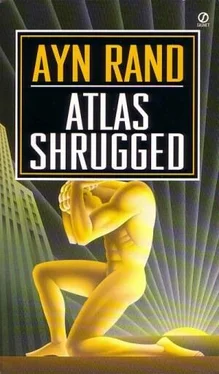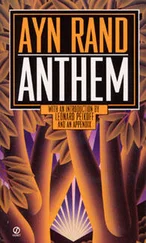He had stopped at the window. He stood for a moment, looking out. "Do you know that the first load of rail is being delivered to you today?" he asked, "Of course I know it."
"Come here."
She approached him. He pointed silently. Far in the distance, beyond the mill structures, she saw a string of gondolas waiting on a siding.
The bridge of an overhead crane cut the sky above them. The crane was moving. Its huge magnet held a load of rails glued to a disk by the sole power of contact. There was no trace of sun in the gray spread of clouds, yet the rails glistened, as if the metal caught light out of space. The metal was a greenish-blue. The great chain stopped over a car, descended, jerked in a brief spasm and left the rails in the car. The crane moved back in majestic indifference; it looked like the giant drawing of a geometrical theorem moving above the men and the earth.
They stood at the window, watching silently, intently. She did not speak, until another load of green-blue metal came moving across the sky. Then the first words she said were not about rail, track or an order completed on time. She said, as if greeting a new phenomenon of nature: "Rearden Metal . . ."
He noticed that, but said nothing. He glanced at her, then turned back to the window.
"Hank, this is great."
"Yes."
He said it simply, openly. There was no flattered pleasure in his voice, and no modesty. This, she knew, was a tribute to her, the rarest one person could pay another: the tribute of feeling free to acknowledge one's own greatness, knowing that it is understood.
She said, "When I think of what that metal can do, what it will make possible . . . Hank, this is the most important thing happening in the world today, and none of them know it."
"We know it."
They did not look at each other. They stood watching the crane. On the front of the locomotive in the distance, she could distinguish the letters TT. She could distinguish the rails of the busiest industrial siding of the Taggart system.
"As soon as I can find a plant able to do it," she said, "I'm going to order Diesels made of Rearden Metal."
"You'll need them. How fast do you run your trains on the Rio Norte track?"
"Now? We're lucky if we manage to make twenty miles an hour."
He pointed at the cars. "When that rail is laid, you'll be able to run trains at two hundred and fifty, if you wish."
"I will, in a few years, when we'll have cars of Rearden Metal, which will be half the weight of steel and twice as safe."
"You'll have to look out for the air lines. We're working on a plane of Rearden Metal. It will weigh practically nothing and lift anything.
You'll see the day of long-haul, heavy-freight air traffic."
"I've been thinking of what that metal will do for motors, any motors, and what sort of thing one can design now."
"Have you thought of what it will do for chicken wire? Just plain chicken-wire fences, made of Rearden Metal, that will cost a few pennies a mile and last two hundred years. And kitchenware that will be bought at the dime store and passed on from generation to generation. And ocean liners that one won't be able to dent with a torpedo."
"Did I tell you that I'm having tests made of communications wire of Rearden Metal?"
"I'm making so many tests that I'll never get through showing people what can be done with it and how to do it.”
They spoke of the metal and of the possibilities which they could not exhaust. It was as if they were standing on a mountain top, seeing a limitless plain below and roads open in all directions. But they merely spoke of mathematical figures, of weights, pressures, resistances, costs.
She had forgotten her brother and his National Alliance. She had forgotten every problem, person and event behind her; they had always been clouded in her sight, to be hurried past, to be brushed aside, never final, never quite real. This was reality, she thought, this sense of clear outlines, of purpose, of lightness, of hope. This was the way she had expected to live—she had wanted to spend no hour and take no action that would mean less than this.
She looked at him in the exact moment when he turned to look at her. They stood very close to each other. She saw, in his eyes, that he felt as she did. If joy is the aim and the core of existence, she thought, and if that which has the power to give one joy is always guarded as one's deepest secret, then they had seen each other naked in that moment.
He made a step back and said in a strange tone of dispassionate wonder, "We're a couple of blackguards, aren't we?"
"Why?"
"We haven't any spiritual goals or qualities. All we're after is material things. That's all we care for,"
She looked at him, unable to understand. But he was looking past her, straight ahead, at the crane in the distance. She wished he had not said it. The accusation did not trouble her, she never thought of herself in such terms and she was completely incapable of experiencing a feeling of fundamental guilt. But she felt a vague apprehension which she could not define, the suggestion that there was something of grave consequence in whatever had made him say it, something dangerous to him. He had not said it casually. But there had been no feeling in his voice, neither plea nor shame. He had said it indifferently, as a statement of fact.
Then, as she watched him, the apprehension vanished. He was looking at his mills beyond the window; there was no guilt in his face, no doubt, nothing but the calm of an inviolate self-confidence.
"Dagny" he said, "whatever we are, it's we who move the world and it's we who'll pull it through."
CHAPTER V
THE CLIMAX OF THE D'ANCONIAS
The newspaper was the first thing she noticed. It was clutched tightly in Eddie's hand, as he entered her office. She glanced up at his face: it was tense and bewildered.
"Dagny, are you very busy?"
"Why?"
"I know that you don't like to talk about him. But there's something here I think you ought to see."
She extended her hand silently for the newspaper.
The story on the front page announced that upon taking over the San Sebastian Mines, the government of the People's State of Mexico had discovered that they were worthless—blatantly, totally, hopelessly worthless. There was nothing to justify the five years of work and the millions spent; nothing but empty excavations, laboriously cut. The few traces of copper were not worth the effort of extracting them. No great deposits of metal existed or could be expected to exist there, and there were no indications that could have permitted anyone to be deluded. The government of the People's State of Mexico was holding emergency sessions about their discovery, in an uproar of indignation; they felt that they had been cheated.
Watching her, Eddie knew that Dagny sat looking at the newspaper long after she had finished reading. He knew that he had been right to feel a hint of fear, even though he could not tell what frightened him about that story.
He waited. She raised her head. She did not look at him. Her eyes were fixed, intent in concentration, as if trying to discern something at a great distance.
He said, his voice low, "Francisco is not a fool. Whatever else he may be, no matter what depravity he's sunk to—and I've given up trying to figure out why—he is not a fool. He couldn't have made a mistake of this kind. It is not possible. I don't understand it."
"I'm beginning to."
She sat up, jolted upright by a sudden movement that ran through her body like a shudder. She said: "Phone him at the Wayne-Falkland and tell the bastard that I want to see him."
"Dagny," he said sadly, reproachfully, "it's Frisco d'Anconia."
"It was."
She walked through the early twilight of the city streets to the Wayne-Falkland Hotel. "He says, any time you wish," Eddie had told her. The first lights appeared in a few windows high under the clouds.
Читать дальше










